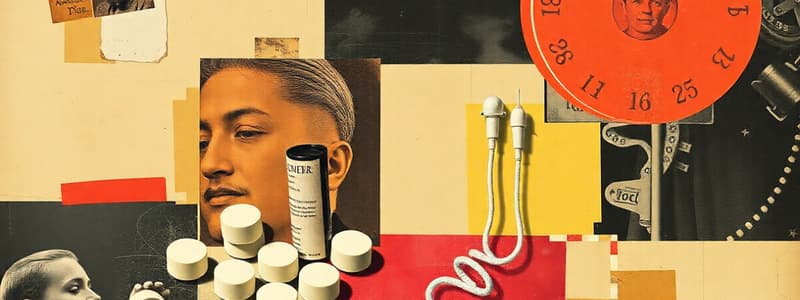Podcast
Questions and Answers
Which adrenergic drug is primarily used for life-saving interventions during anaphylaxis?
Which adrenergic drug is primarily used for life-saving interventions during anaphylaxis?
- Epinephrine (correct)
- Dopamine
- Albuterol
- Glycopyrrolate
What is the primary effect of beta2-adrenergic receptors at the cellular level?
What is the primary effect of beta2-adrenergic receptors at the cellular level?
- Increase heart rate
- Lower blood pressure
- Cause bronchodilation (correct)
- Enhance kidney function
Which of the following is an important patient teaching point for individuals taking beta-blockers?
Which of the following is an important patient teaching point for individuals taking beta-blockers?
- Avoid all physical activity
- Stop the medication if you feel dizzy
- Monitor your pulse and blood pressure regularly (correct)
- Increase your intake of caffeinated beverages
What is a common side effect of anticholinergic drugs like glycopyrrolate?
What is a common side effect of anticholinergic drugs like glycopyrrolate?
Which cholinergic drug is used to ease urinary retention post-surgery?
Which cholinergic drug is used to ease urinary retention post-surgery?
What is a contraindication for prescribing cholinergic drugs?
What is a contraindication for prescribing cholinergic drugs?
Which drug is commonly recognized for its use in preventing acute asthma symptoms?
Which drug is commonly recognized for its use in preventing acute asthma symptoms?
What should patients using anticholinergic drugs be cautious of to avoid dehydration?
What should patients using anticholinergic drugs be cautious of to avoid dehydration?
Flashcards
Adrenergic Drugs
Adrenergic Drugs
Medications that mimic the Sympathetic Nervous System (SNS).
Epinephrine
Epinephrine
A drug that opens bronchi and increases blood pressure, used in emergencies like anaphylaxis.
Beta2-Adrenergic Receptors
Beta2-Adrenergic Receptors
Receptors that cause bronchodilation, important for asthma treatment.
Beta1-Adrenergic Receptors
Beta1-Adrenergic Receptors
Signup and view all the flashcards
Anticholinergic Drugs
Anticholinergic Drugs
Signup and view all the flashcards
Glycopyrrolate
Glycopyrrolate
Signup and view all the flashcards
Cholinergic Drugs
Cholinergic Drugs
Signup and view all the flashcards
Donepezil
Donepezil
Signup and view all the flashcards
Study Notes
Adrenergic Drugs: Sympathetic Superpowers
- Mimic the Sympathetic Nervous System (SNS)
- Epinephrine: Opens bronchi, increases blood pressure (e.g., anaphylaxis)
- Dopamine: Enhances cardiac output (e.g., shock management)
- Key Receptors:
- Beta2-Adrenergic: Bronchodilation (e.g., asthma)
- Beta1-Adrenergic: Heart rate and strength of contractions
- Patient Teaching:
- Do not abruptly stop beta-blockers (e.g., Atenolol)
- Monitor pulse and blood pressure regularly
- Be aware of hypoglycemia symptoms when using beta-blockers
Anticholinergic Drugs: PNS Blockers
- Block the Parasympathetic Nervous System (PNS)
- Reduce secretions, slow systems
- Glycopyrrolate: Used pre-surgery to reduce oral and GI secretions.
- Oxybutynin: Decreases urinary frequency, helps with bladder control.
- Watch for:
- Dry mouth
- Blurred vision
- Constipation
- Special Notes for Active Seniors: Stay cool to prevent heat stroke due to reduced sweating.
Cholinergic Drugs: Boosting Acetylcholine
- Stimulate the PNS by increasing acetylcholine levels
- Donepezil: Improves memory in Alzheimer's patients (not a cure)
Disease-Specific Drug Applications
- Heart Conditions: Carvedilol treats mild heart failure. Watch for worsening heart failure symptoms (edema, shortness of breath).
- Respiratory Management: Albuterol helps during acute asthma attacks (tachycardia possible). Salmeterol prevents, but does not treat, sudden asthma symptoms.
- Neurological Focus: Memantine manages symptoms of Alzheimer's Disease. Pyridostigmine improves swallowing in Myasthenia Gravis (take 30 minutes before meals).
Clinical Scenarios
- Phentolamine: Prevents tissue damage from vasopressors (e.g., dobutamine).
- Physostigmine: Antidote for atropine overdose.
Patient Education Essentials
- Safety Precautions: Notify a doctor if pulse drops below 60 bpm while on beta-blockers. Avoid overheating if taking anticholinergics, stay hydrated.
- Timing Is Everything: Apply Scopolamine Patch 4-5 hours before travel, schedule cholinergic drugs carefully with meals
- Herbal Awareness: Ginkgo biloba increases bleeding risk when combined with aspirin.
Studying That Suits You
Use AI to generate personalized quizzes and flashcards to suit your learning preferences.




